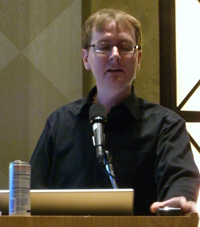
Rob Curley, Vice President for Product Development,
Washingtonpost.Newsweek Interactive (WPNI)
“News sites need to pay attention to the way the Internet works
instead of the way we might want it to work.”
 In a speech that could have been titled, “Innovation and a Red Bull,” WPNI’s Rob Curley gave a high-speed tour of how to breathe interactivity into local MSM sites.
In a speech that could have been titled, “Innovation and a Red Bull,” WPNI’s Rob Curley gave a high-speed tour of how to breathe interactivity into local MSM sites.
“Back in 1996, daily papers in the top 80 markets were the number one ranked Web sites for their towns. But not anymore. Now the top ranked sites are TV sites. How did this happen? Newspapers have 10 to 20 times the reporting force of a local TV station. But TV Web sites are very good at breaking news and very good at posting video that people like to watch: video of high school running backs getting a touchdown or a community church burning down. They have touched what’s correct,” Curley said.
“How can we turn this around? What would a local newspaper have to do? Really own local news. If there’s a fire in your town and everyone can see the smoke and they log onto your site and you think it can wait until tomorrow – you have to fix this immediately.”
Curley advised emphasizing hyperlocal content, going overboard with multimedia, using database-drive coverage, filling sites with evergreen content and embracing platform-independent delivery.
“We have to be designing our sites for the cell phone. Our content is uniquely positioned to work well in the mobile environment.” Plus, Curley warned news sites against charging users for access. “The only thing people will pay for on the internet is nudity. Right now they aren’t going to pay for our content. The paradigm changed with TV and people pay for cable, but the paradigm hasn’t shifted yet for the internet.”
Curley showed examples of the pioneering hyperlocal, hyper-interactive sites he helped create at local papers. “It starts with content that matters to people. In Kansas, that would be college basketball.” When University of Kansas decided to create a new point system for allotting season tickets, Curley and his team developed a site with an interactive calculator that helped people figure out what seats they would be entitled to, complete with a photo view of the court from their new seats.
Along with Adrian Holovaty, he launched an online section called “Game” which covered everything from Little League to high school football. The site had fully downloadable schedules, cancellation alerts, 360-degree photos of every field, and SMS service so that working parents could opt to receive cell phone calls every time the score changes.
Unlike newspaper voter guides that come out on the eve of an election, in Florida, Curley created an interactive guide months earlier along with a series of issue questions for readers to answer and a report on which candidates answered most like you.
At Naples Daily News, his team brought ultimate interactivity to the 2006 Naples Wine Festival, with video tours of the luxurious homes where wine-tasting parties take place, profiles of the hosts and details of their personal wealth, descriptive menus created by famous chefs and wine lists by vintners, etc. The site gave average citizens access to high-ticket parties and a window into the lives of the rich and famous in their community.
When he moved to The Washington Post, Publisher Don Graham told Curley, “We know how to do the Big-J journalism, but we forgot how to cover the prom.” So, the first thing Curley helped create was onBeing, a site featuring edited videos of ordinary people talking about their identities and personal challenges. The popular series won a Knight-Batten Award and brings a ton of traffic to the Post’s Web site and boosts the presence of local voices at a news institution that’s best known for national coverage.
The Washington Post was the first newspaper to build an application on Facebook. It’s a compass that tells where you and your friends are on the political spectrum and you can sort by region or category, such as all GWU students or all English majors, etc.
The big new project in Curley’s portfolio is LoudounExtra.com, a Washington Post-created hyperlocal, hyper-interactive site for Loudoun County, Va, one of the fastest-growing and wealthiest counties in the U.S. The site is constantly updated with breaking news, calendar listings, and commentary from local bloggers. Live Webcams show what’s happening on local roads, a top priority for commuters. The site includes a wealth of interactive evergreen content including databases of local restaurants and pages for every school and local sports team. Users can easily find out when their favorite sushi bar stops serving food or access the score for the high school football team at half-time. The site boasts a complete guide to places of worship including basic information and history, 360-degree photos and in some cases, digital audio of Sunday services. Beams Curley, “We’ll soon be Godcasting.”
Curley cautions newspapers not to move under-performing staffers into the Web operations. The online product has to have the most talented, creative people in the building, the best writers and hardest workers.
Predictions? “I think we’re going to see an uber-local news publication that doesn’t have a print legacy product. That’s going to happen in 18 months.”
|
Click below to jump to panels: Touching the Community – Outside Traditional Media
Filling in the Gaps – Emerging Competition
Twenty in Thirty – Twenty Good Ideas for Citizen Participation
An Inside Look at the Strategy Behind LoudounExtra.com
AP’s “Now Public” Initiative
Mainstream Media Goes Hyperlocal
Lessons Learned – Backfence.com
|






